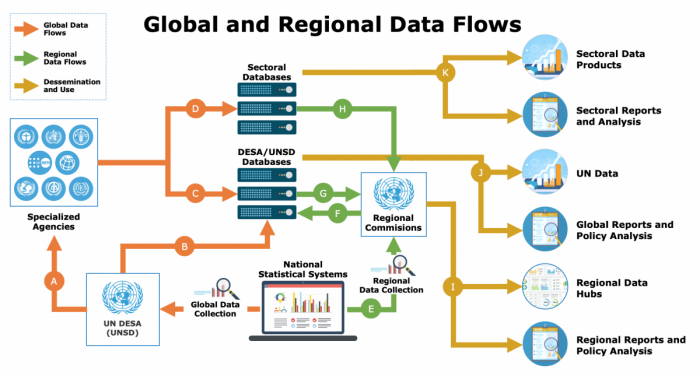Evidence-based Public Policymaking in the Arab Region



8 July 2020
By Wafa Aboul Hosn, Chief of Economic Statistics, and Juraj Riecan, Director of Statistics, Information Society and Technology Cluster, Economic and Social Commission for Western Asia
Data and statistics are no longer the purview of researchers and academics. This has become most evident with the COVID-19 pandemic, as people worldwide are following daily statistics on confirmed cases, deaths, and PCR (polymerase chain reaction) testing, and governments put in place policies to contain the spread of the disease among their population.
Vital and health statistics are administrative data sources that feed into official statistical systems and can be critical to effective public policymaking. Specifically, official statistics produced by national statistical offices (NSO) and the national statistical systems (NSS) , serve as robust, high-quality, and impartial bases for evidence-based policies (EBP). Using statistical evidence, policymakers can target responses to social and economic issues at the right time and place, thereby improving government service delivery.[1]
In 2013, the Economic and Social Commission for Western Asia (ESCWA) developed a conceptual framework for enhancing the effective use of statistics in EBP in the Arab region.[2] The framework presented the benefits and priority issues of EBP in the context of the development agenda, tackling shortfalls in statistical processes and documenting and sharing good practices among countries.
Statistics for EBP in Arab countries
Based on the framework, countries met statistical data needs for EBP:
- in the preparation of national development strategies and plans in Jordan and Iraq;
- on the relationship between users and producers; and
- on the assessment of development goals in Morocco.
Additionally, Gulf countries, through the Gulf Cooperation Council Statistical Center (GCC-Stat), developed joint statistical programs that serve policymaking in their respective countries. More recently, Jordan, Egypt, and Palestine shared best practices, equipment, and Arabic applications for the 2020 round of their GIS-based population and housing census, which provided basis for policies on refugees, poverty reduction and urban planning.
This co-investment and knowledge sharing can be experimented with in other countries that use a common language. To continue providing statistical evidence to urgently inform on COVID-19 responses, NSSs in most Arab Countries undertook rapid assessments of the impact of COVID on lives and livelihoods.
Three main challenges for the implementation of statistics for EBP
Due to instability and conflict, Syria, Iraq, Libya, Sudan, and Yemen each confronts big challenges to the essential functions of its statistical system as statistical production has been disrupted during years of crisis. This is a critical challenge as data is needed most for informing the rebuilding of societies and economies.
Another challenge for the region on the use of statistics for EBP is ensuring a greater level of independence for national statistical systems to release sensitive official figures on growth, poverty, inflation, and unemployment to generate stronger public trust.[3]
ESCWA’s framework needs to be constantly updated and adapted to integrate more good practices; to address modernization, agility and responsiveness of NSSs; and to continue to be relevant for the 2030 Agenda for Sustainable Development and current global challenges. Amid economic, financial and health crises, support and funding of NSOs in developing and poor countries is mostly needed to improve their systems and infrastructure to address emerging needs.
Data links to UN mandate
In a historical milestone for the international statistical community, the United Nations General Assembly adopted a resolution on 29 January 2014 concerning the Fundamental Principles of Official Statistics. The resolution reaffirmed the importance of the use of good statistics as evidence for decision-making. Official data produced by NSSs from all Member States feed into the data supply chain of the UN network at global and regional data repositories, including ESCWA’s Data Portal, as shown in the diagram below.[4] The data provides the basis for UN global and regional reports on sustainable development, on social and economic developments, financing, trade, population, migration and others.

Note: The views expressed herein are those of the author and do not necessarily reflect the views of the United Nations.
[1] Cairney. P. 2016. The Politics of Evidence-Based Policy Making Oxford Research Encyclopedia of Politics UNESCWA Effective Use of
[2] Statistics in Evidence-Based Policymaking Conceptual Framework. E/ESCWA/SD/2013/TP.1
[4] United Nations Fundamental Principles of Official Statistics Implementation guidelines 2015. Global data flows bring data (A) to UNSD) and the UN specialized agencies. These serve feeding data and updating the content of the centralized UN database https://unstat.un.org/ either directly (B) or through specialized agencies (C). Specialized agencies also update the sectoral databases (D). Data are published either by UN Headquarters (J) or specialized agencies (K). The regional data flows are directed mainly to the UN regional commissions (E), with a minor part of data collected by regional offices of specialized agencies. Regional Commissions disseminated these data (I) through the regional data hubs and use them for production of regional reports, studies and policy analysis. Regional Commissions also provide data to global statistical databases (F), and complement their own data collection from UNSD databases (G) and specialized agencies (H).

